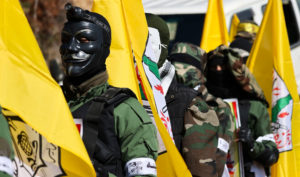The images beggared belief. Palestinian gunmen driving through an Israeli city, firing at passers-by from the bed of a pickup truck. The body of a dead Israeli soldier, his green uniform stained red, being dragged from a car inside Gaza and trampled. An elderly woman, seemingly in shock, taken hostage and paraded through the streets in a golf cart.
It is hard to make sense of the day’s events — because they are unprecedented. What should have been a quiet holiday-weekend Shabbat began with Hamas firing more than 2,200 rockets at Israel. The massive barrage seems to have been cover for an even bigger operation: infiltrating dozens of militants into Israel. Some went to Sderot, the biggest city near Gaza; others fanned out to the small kibbutzim that run the length of the border.
By evening the death toll stood at 150, with at least 1,100 Israelis wounded. Both numbers will almost certainly rise, and the Israeli army says it is still fighting in 22 locations. Hamas also claims to have abducted 35 Israelis and brought them to Gaza. While the exact number is unconfirmed, footage shared on social media suggests they do indeed have captives, both civilians and soldiers.
The most obvious question is what went wrong: this is Israel’s biggest intelligence failure in half a century, since the surprise Arab invasion on Yom Kippur in 1973. Its security services have a network of informants in Gaza. Every call from a mobile phone in the territory is routed through an Israeli network.
Hamas must have needed many months to plan such a complex operation — and Israel knew the group wanted to conduct one like this. During its 2014 war with Israel, Hamas smuggled commandos through a tunnel and landed a group of frogmen on an Israeli beach. The Israeli army has warned for years that the group would try more such infiltrations. Yet when it finally happened, the army seems to have been caught entirely unaware.
Nor was this just an intelligence failure. Israel has kept Gaza under a tight blockade for a decade and a half. Heavy restrictions on the flow of goods and people have crushed its economy: two-thirds of Gazans live below the poverty line, and three in five are unemployed. But the blockade has not unseated Hamas — nor, apparently, stopped it from planning sophisticated attacks.
The Israeli government has spent billions of shekels to build a barrier on its border with Gaza, a mix of concrete slabs and metal fencing studded with high-tech sensors. Yet the militants simply cut through it and zipped across on motorbikes, or flew over it in paragliders.
Once they crossed over, they enjoyed freedom of action for hours. All morning long, residents of border towns called Israeli journalists to ask where the army was. In recent months it has mostly been deployed on other fronts: the occupied West Bank, where tensions are at a boil, and the north, where it is worried about Hezbollah. The south seemed quiet — until it wasn’t.
A full accounting will probably have to wait until the inevitable commission of inquiry finishes its work. For now, the focus will be on a response. Prime Minister Binyamin Netanyahu has said Israel is “at war”; the defence ministry has approved a wide call-up of army reservists; the air force has already begun air strikes on Gaza, which will continue for days.
During the 2014 war, which dragged on for 50 days, some of Netanyahu’s Right-wing coalition partners pushed for a full ground invasion of Gaza. Avigdor Lieberman, the foreign minister at the time, wanted Israel to reoccupy the territory (Israel withdrew its troops and settlers from Gaza in 2005). But the army feared that a ground offensive would lead to weeks of bloody urban combat. Netanyahu listened to the generals and ignored the politicians.
Such demands, however, will be harder to ignore this time. The cause for war is much bigger. And Netanyahu’s coalition is different: where in 2014 it was a broad mix of parties, from the centre-left to the Right, today it runs only from the Right to the far-Right.
The presence of Israeli hostages in Gaza — probably distributed across a number of far-flung hiding places — may make some officials reluctant to green-light a ground offensive, in case they are executed. But they are also worth more to Hamas alive than dead. The group would prefer to exchange them for prisoners held by Israel, as it did in 2011 with Gilad Shalit, a soldier swapped for 1,027 Palestinians.
So, how will Israel respond? This has been a turbulent year for the country, largely due to Netanyahu’s efforts to overhaul its judiciary. Yet after Hamas’s latest attack, political divisions have been temporarily set aside. Activists have suspended their weekly demonstrations against the government. They also urged reservists — some of whom vowed to boycott their mandatory service in protest over Netanyahu’s reforms — to report for duty if called. Israelis have a saying in times like this: “There is no coalition and no opposition.”
When the fighting ends, though, the recriminations will start. The opposition will have a compelling argument: it will say that Netanyahu has been preoccupied, and that he has surrounded himself with a coterie of inexperienced ministers, such as Itamar Ben-Gvir, the hard-Right ideologue appointed to run the police. And they will have a point. Netanyahu’s pitch to voters has always rested on his handling of Israeli security. Yet “Mr Security” has a habit of falling out with his security chiefs. Ehud Barak, who served him as defence minister, later described his old boss as “reckless”; Meir Dagan, a storied Mossad director, called him “destructive”. True to form, he will try to pin blame for this weekend’s catastrophe on the army and security services.
While the intelligence failure resembled 1973, in other ways the closest analogue for the day’s events was Israel’s war of independence in 1948. During the 1973 war, after all, Egypt and Syria only advanced as far as the occupied Sinai Peninsula and Golan Heights. This time, Palestinian militants stormed Israel proper, raiding towns that are within its internationally recognised borders.
The resulting images — of gunmen on the streets and dead bodies piled at bus stops —will not soon be forgotten. The second intifada, the campaign of Palestinian suicide bombings that killed more than 1,000 Israelis between 2000 and 2005, was a death knell for the peace talks that followed the Oslo Accords in 1993. A generation of Israelis gave up on the prospect of a settlement with the Palestinians. Today’s attack, perhaps the worst in Israel’s history, will similarly harden public opinion.
But Israel will have to weigh the consequences of its response. Hezbollah, the Shia militant group-cum-political party in Lebanon, said it was “conducting a continuous assessment of events”, a verbose way of saying it plans to sit on the side-lines — at least for now. Mired in a four-year economic crisis, Lebanon is in no position to endure a war. But a harsh Israeli counterattack on Gaza may draw it in anyway, lest its leaders be seen as ignoring the Palestinian cause.
Hamas will also use the attack to boost its popularity in the West Bank, where the Palestinian Authority, the nominal self-governing body, is widely loathed. Mahmoud Abbas, the president, is 87; Hamas no doubt has an eye on an eventual succession struggle.
Further afield, until this morning, diplomatic parlour talk in the Middle East was obsessed with the possibility that Saudi Arabia might normalize ties with Israel. The Biden administration has spent the year pushing for a three-way deal: America would offer a defence pact to the kingdom, which would offer full recognition to Israel.
What Israel might give was always unclear. The Americans and Saudis hoped to extract some concessions that would make the occupation marginally less painful for Palestinians. That idea was never realistic, given Netanyahu’s hard-Right coalition; now it is impossible. Nor will the Saudis be eager to recognise Israel against the backdrop of a war in Gaza.
After 15 years of almost-uninterrupted Netanyahu rule, many people inside Israel and out have internalised his view of the conflict: that the status quo is indefinitely sustainable. Today’s events should shake that view. Hamas is more capable and less quiescent than Israel thought; in the West Bank, meanwhile, the PA is rapidly losing control. Yet an Israel united in grief and anger will be in no mood for talks or concessions. The status quo has never looked so fragile — and what comes next will be bloody.
Disclaimer
Some of the posts we share are controversial and we do not necessarily agree with them in the whole extend. Sometimes we agree with the content or part of it but we do not agree with the narration or language. Nevertheless we find them somehow interesting, valuable and/or informative or we share them, because we strongly believe in freedom of speech, free press and journalism. We strongly encourage you to have a critical approach to all the content, do your own research and analysis to build your own opinion.
We would be glad to have your feedback.
Source: UnHerd Read the original article here: https://unherd.com/




